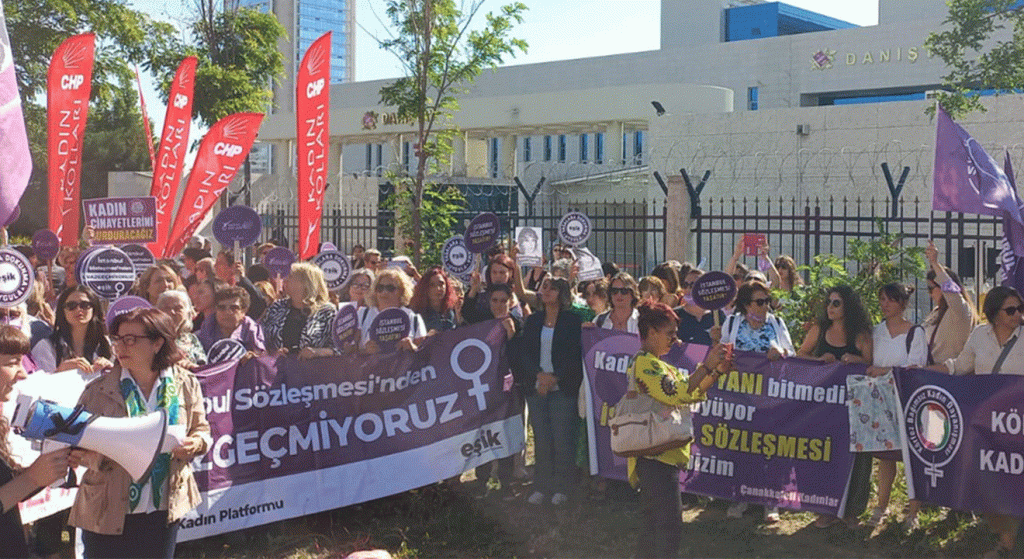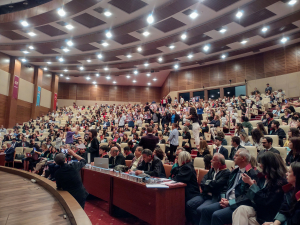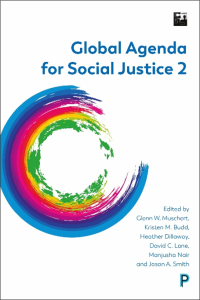Today is the first anniversary of the day Turkey ceased to be a party to the Istanbul Convention. Özlem Altiok writes on the patriarchal backlash against women’s hard-won rights, and how the women’s and LGBTI+ movements refused to give up and continue to struggle for the Convention.
Imposing in its security detail rather than through any architectural distinction, the Council of State (Danıştay), Turkey’s highest administrative court, is meant to provide a check on the executive branch. Following President Erdogan’s decision to withdraw from the Istanbul Convention, the court has become an unlikely focus for feminist activism in Turkey.
The Istanbul Convention is the short name for the Council of Europe Convention on preventing and combating violence against women (VAW) and domestic violence. It is a regional treaty concerning fundamental human rights, obligating states to establish comprehensive national legal and educational systems to realise gender equality in order to prevent VAW. The Istanbul Convention is to Europe what the Belém do Pará Convention is to South America.
Ironically, the Convention was opened to signature in Istanbul, and Turkey was the first country to sign it. When a high-ranking member of the ruling party uttered the possibility of withdrawal in July 2020, women and LGBTI+ activists were shocked and immediately gathered (virtually) to assess the threat and defend the Convention. At the height of the pandemic, and given the restrictions on the freedom of movement and association in Turkey, they drew on two resources to coordinate a response and strategy. First, they built on existing networks and practice of working together in solidarity. Second, they exploited the possibilities of Zoom.
Zoom meetings became a place to cope, learn and organise, where women would meet ‘face to face’ to discuss the increase in and intensification of VAW, and develop public campaigns against the government’s anti-woman policies. These Zoom meetings gave birth to some new organisations such as Women’s Platform for Equality (EŞİK), established to counter the systematic attacks on women’s hard-won rights.
How could a state that was the first to sign this Council of Europe treaty, seen as the gold standard in preventing violence against women, leave it? How could Turkey, where at least three women are murdered each day, justify withdrawing from an international treaty affirming women’s most fundamental human right – to live and to live free from violence? How could Turkey withdraw given that its parliament had voted unanimously to ratify the Convention in 2012?
Most importantly, how could we prevent this from happening? In addition to organising a major campaign to raise awareness of the potential withdrawal from the Convention, EŞİK activists started meeting opposition leaders over Zoom. These political leaders (all men) thought that the government could not afford to make such an unprecedented and scandalous move.
The President’s decision to withdraw from the Istanbul Convention was published in the Official Gazette in the small hours of 20 March 2021. The justification for the decision came two days later, as an afterthought, in the form of a statement from the Presidency’s Directorate of Communications:
“The Istanbul Convention, originally intended to promote women’s rights, was hijacked by a group of people attempting to normalize homosexuality – which is incompatible with Türkiye’s social and family values. Hence the decision to withdraw.”
It is hard to think of a more terrifying reason, with more terrifying implications, for the future of other human rights treaties, including the European Convention of Human Rights, Lanzarote Convention and CEDAW.
The purpose of the Istanbul Convention is to prevent and combat VAW. The Convention does not make any specific reference to LGBTI+ rights. A tangible product of decades of feminist activism, the Istanbul Convention does specify that gender inequality is a root cause of VAW and obligates states to take specific measures and take them without discrimination (Article 4.3)
Could anyone argue that the state should protect some victims of gender-based violence and not others?
Of course, the women’s and LGBTI+ movements in Turkey accepted neither the withdrawal decision nor the stated reason for it. They have used all the available means to defend the Istanbul Convention and their hard-won rights. Skillfully using Zoom and social media platforms, women declared the decision null and void. Moving from Zoom to the streets in June 2021, in the midst of a raging pandemic, they organised a protest in Istanbul where many met each other in person for the first time. Having called on the Council of Europe to investigate the legality of Turkey’s action, women also demanded that their country’s highest administrative court place a stay on the President’s decision. Women’s, and other civil society organisations, and bar associations around Turkey filed more than 200 lawsuits against the President’s unlawful decision.
In April and June 2022, the court hearings for these cases brought hundreds of feminist lawyers and women’s rights defenders into the Council of State. The hearings were historic events.

Outside the Council of State on June 23, 2022. Photo taken by an EŞİK activist.

Inside the courtroom, families of femicide victims holding photos of their lost ones as the lawyer, Müjde Tozbey, speaks. Photo taken by author.
At the first one, on 28 April, more than 800 people, mostly women, filled the 650-seat courtroom. The presiding judge began the hearing saying “This is unprecedented in the history of the Council of State; this is the first hearing we will hold with such a large crowd.”
As impressive as the crowd in the courtroom were the plaintiffs’ lucid and forceful arguments that the president does not have the authority to withdraw from an international treaty concerning fundamental human rights. Article 90 of the Turkish Constitution is crystal clear: the authority to ratify international treaties rests with Parliament. Using this authority in 2011, Turkey’s parliament ratified unanimously the Istanbul Convention and enacted Law No. 6251, which is still in effect, and can be repealed only through an act of parliament.
At the second hearing, on 7 June, the president’s lawyers continued to defend Erdogan’s decision, saying that withdrawal does not compromise Turkey’s fight against VAW and that a Presidential Decree (also signed by Erdogan) authorises his action. Sidestepping the substantive issue of what public benefit results from the withdrawal decision, one of them mansplained: “It looks straightforward, but the matter is much more complicated.” His arrogance and convoluted defence contrasted with the lucidity of the case against the withdrawal decision.
At these hearings, women transformed the courtroom into a classroom of sorts, with feminist lawyers presenting more than legal arguments to the judges. Some also occasionally turned to face the hundreds of participants filling the room, leading the presiding judge to interrupt: “please face and address the court.”
Feminist lawyers gave mini-lectures on the history of the movement to make the personal political, and concrete examples to link gender inequality and VAW. They highlighted sexism in the judiciary, and the failure of the state to protect women. The courtroom fell into a deep silence and sadness as one of the lawyers read names of femicide victims from this year.
Council of State prosecutors have already delivered, and reiterated in each court hearing, their opinions on the unlawfulness of President Erdogan’s decision. While important, prosecutors’ opinions are not binding. The judges will announce their decision in July. We may not know what that decision will be yet, but we do know that if it is not in favour of the Istanbul Convention and the rule of law, women will continue to challenge it.
The government’s nationalist/populist propaganda that VAW could be prevented using ‘local and national’ laws instead of a ‘foreign’ treaty persuades few. The women’s movement in Turkey considers the Convention its own, seeing it as a tangible product of the collective cumulative struggles of feminists around the world. Scholars such as Feride Acar were among those who drafted the Convention. It is with the support of the women’s movement in Turkey that she became the first President of GREVIO, the independent body of experts tasked with monitoring the implementation of the Convention.
The withdrawal decision has implications for the future of multilateralism, international law and global politics. Most immediately, Turkey’s withdrawal is a concrete example of the damage inflicted by the patriarchal backlash against women’s hard-won rights. It is also indicative of the erosion of democracy and the rule of law.
It is because they understand this that women have been saying, as if their lives depended on it, and using all means available to them – whether on Zoom, the street or in the courtroom – “We do not give up the Istanbul Convention!”.
Özlem Altiok is a full-time lecturer holding a joint appointment with Women’s and Gender Studies and International Studies at the University of North Texas.
 Özlem Altiok is a contributor of the chapter ‘From the Streets to Social Policy: How to end gender-based violence against women’ in the Global Agenda for Social Justice 2, out in September.
Özlem Altiok is a contributor of the chapter ‘From the Streets to Social Policy: How to end gender-based violence against women’ in the Global Agenda for Social Justice 2, out in September.
Bristol University Press newsletter subscribers receive a 25% discount on all our books – sign up here.
Follow Transforming Society so we can let you know when new articles publish.
The views and opinions expressed on this blog site are solely those of the original blog post authors and other contributors. These views and opinions do not necessarily represent those of the Policy Press and/or any/all contributors to this site.
Image credit: Özlem Altıok


